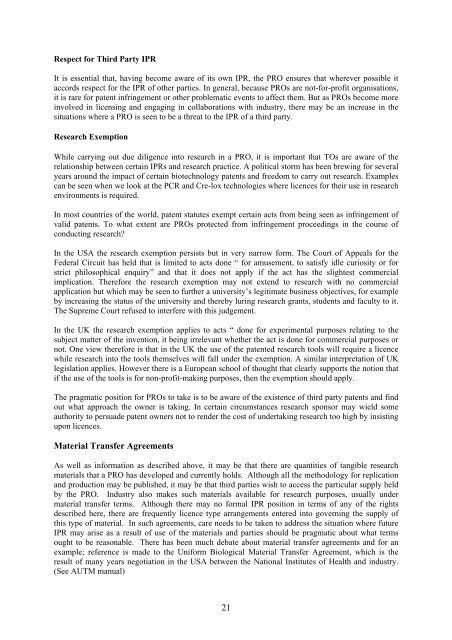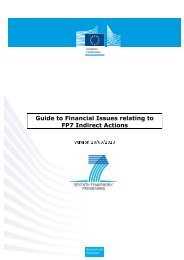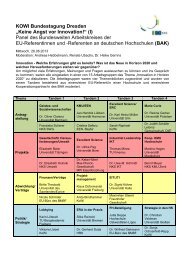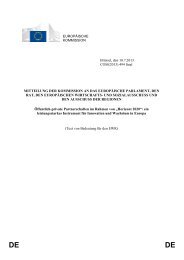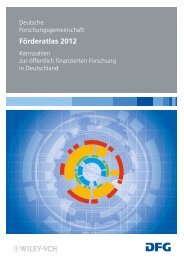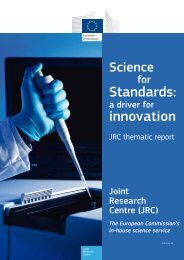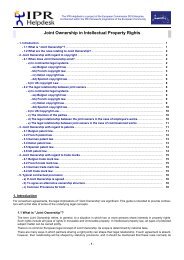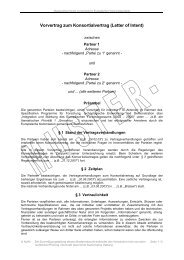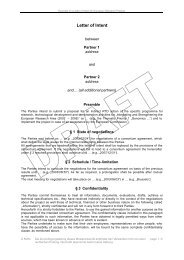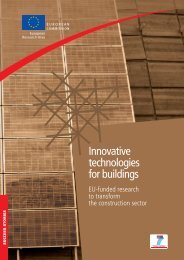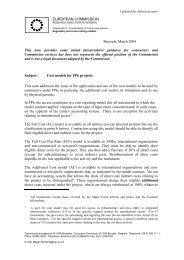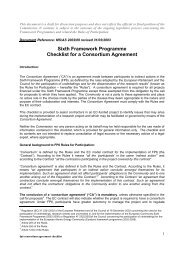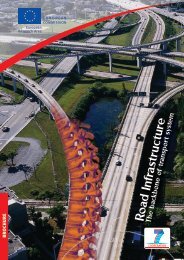Expert Group Report Management of Intellectual Property in ... - KoWi
Expert Group Report Management of Intellectual Property in ... - KoWi
Expert Group Report Management of Intellectual Property in ... - KoWi
Create successful ePaper yourself
Turn your PDF publications into a flip-book with our unique Google optimized e-Paper software.
Respect for Third Party IPR<br />
It is essential that, hav<strong>in</strong>g become aware <strong>of</strong> its own IPR, the PRO ensures that wherever possible it<br />
accords respect for the IPR <strong>of</strong> other parties. In general, because PROs are not-for-pr<strong>of</strong>it organisations,<br />
it is rare for patent <strong>in</strong>fr<strong>in</strong>gement or other problematic events to affect them. But as PROs become more<br />
<strong>in</strong>volved <strong>in</strong> licens<strong>in</strong>g and engag<strong>in</strong>g <strong>in</strong> collaborations with <strong>in</strong>dustry, there may be an <strong>in</strong>crease <strong>in</strong> the<br />
situations where a PRO is seen to be a threat to the IPR <strong>of</strong> a third party.<br />
Research Exemption<br />
While carry<strong>in</strong>g out due diligence <strong>in</strong>to research <strong>in</strong> a PRO, it is important that TOs are aware <strong>of</strong> the<br />
relationship between certa<strong>in</strong> IPRs and research practice. A political storm has been brew<strong>in</strong>g for several<br />
years around the impact <strong>of</strong> certa<strong>in</strong> biotechnology patents and freedom to carry out research. Examples<br />
can be seen when we look at the PCR and Cre-lox technologies where licences for their use <strong>in</strong> research<br />
environments is required.<br />
In most countries <strong>of</strong> the world, patent statutes exempt certa<strong>in</strong> acts from be<strong>in</strong>g seen as <strong>in</strong>fr<strong>in</strong>gement <strong>of</strong><br />
valid patents. To what extent are PROs protected from <strong>in</strong>fr<strong>in</strong>gement proceed<strong>in</strong>gs <strong>in</strong> the course <strong>of</strong><br />
conduct<strong>in</strong>g research?<br />
In the USA the research exemption persists but <strong>in</strong> very narrow form. The Court <strong>of</strong> Appeals for the<br />
Federal Circuit has held that is limited to acts done “ for amusement, to satisfy idle curiosity or for<br />
strict philosophical enquiry” and that it does not apply if the act has the slightest commercial<br />
implication. Therefore the research exemption may not extend to research with no commercial<br />
application but which may be seen to further a university’s legitimate bus<strong>in</strong>ess objectives, for example<br />
by <strong>in</strong>creas<strong>in</strong>g the status <strong>of</strong> the university and thereby lur<strong>in</strong>g research grants, students and faculty to it.<br />
The Supreme Court refused to <strong>in</strong>terfere with this judgement.<br />
In the UK the research exemption applies to acts “ done for experimental purposes relat<strong>in</strong>g to the<br />
subject matter <strong>of</strong> the <strong>in</strong>vention, it be<strong>in</strong>g irrelevant whether the act is done for commercial purposes or<br />
not. One view therefore is that <strong>in</strong> the UK the use <strong>of</strong> the patented research tools will require a licence<br />
while research <strong>in</strong>to the tools themselves will fall under the exemption. A similar <strong>in</strong>terpretation <strong>of</strong> UK<br />
legislation applies. However there is a European school <strong>of</strong> thought that clearly supports the notion that<br />
if the use <strong>of</strong> the tools is for non-pr<strong>of</strong>it-mak<strong>in</strong>g purposes, then the exemption should apply.<br />
The pragmatic position for PROs to take is to be aware <strong>of</strong> the existence <strong>of</strong> third party patents and f<strong>in</strong>d<br />
out what approach the owner is tak<strong>in</strong>g. In certa<strong>in</strong> circumstances research sponsor may wield some<br />
authority to persuade patent owners not to render the cost <strong>of</strong> undertak<strong>in</strong>g research too high by <strong>in</strong>sist<strong>in</strong>g<br />
upon licences.<br />
Material Transfer Agreements<br />
As well as <strong>in</strong>formation as described above, it may be that there are quantities <strong>of</strong> tangible research<br />
materials that a PRO has developed and currently holds. Although all the methodology for replication<br />
and production may be published, it may be that third parties wish to access the particular supply held<br />
by the PRO. Industry also makes such materials available for research purposes, usually under<br />
material transfer terms. Although there may no formal IPR position <strong>in</strong> terms <strong>of</strong> any <strong>of</strong> the rights<br />
described here, there are frequently licence type arrangements entered <strong>in</strong>to govern<strong>in</strong>g the supply <strong>of</strong><br />
this type <strong>of</strong> material. In such agreements, care needs to be taken to address the situation where future<br />
IPR may arise as a result <strong>of</strong> use <strong>of</strong> the materials and parties should be pragmatic about what terms<br />
ought to be reasonable. There has been much debate about material transfer agreements and for an<br />
example; reference is made to the Uniform Biological Material Transfer Agreement, which is the<br />
result <strong>of</strong> many years negotiation <strong>in</strong> the USA between the National Institutes <strong>of</strong> Health and <strong>in</strong>dustry.<br />
(See AUTM manual)<br />
21


